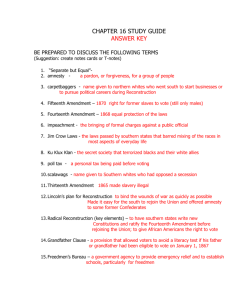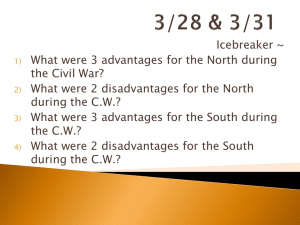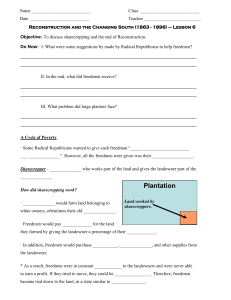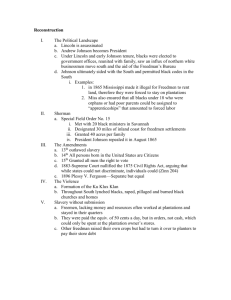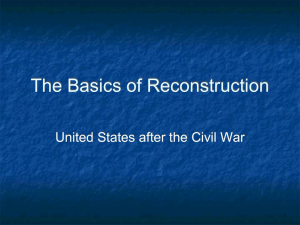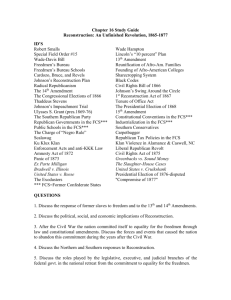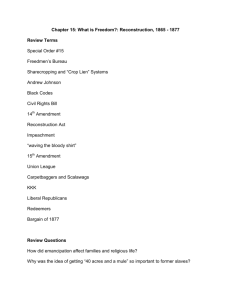Student Name - South Orangetown Central School District
advertisement
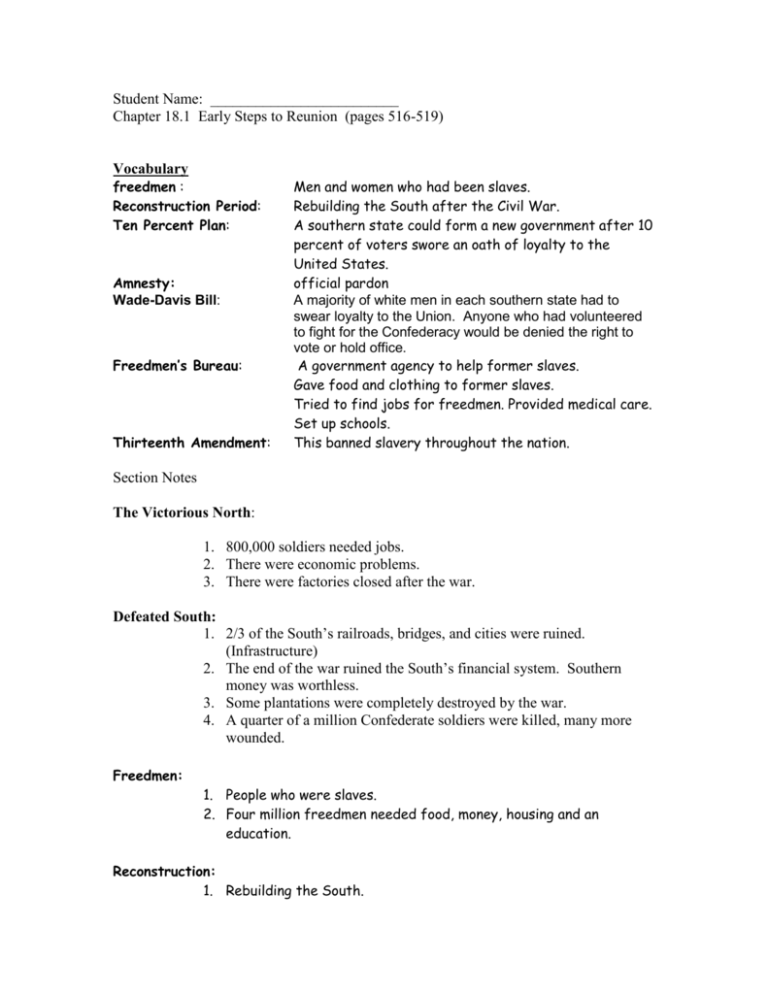
Student Name: _________________________ Chapter 18.1 Early Steps to Reunion (pages 516-519) Vocabulary freedmen : Reconstruction Period: Ten Percent Plan: Amnesty: Wade-Davis Bill: Freedmen’s Bureau: Thirteenth Amendment: Men and women who had been slaves. Rebuilding the South after the Civil War. A southern state could form a new government after 10 percent of voters swore an oath of loyalty to the United States. official pardon A majority of white men in each southern state had to swear loyalty to the Union. Anyone who had volunteered to fight for the Confederacy would be denied the right to vote or hold office. A government agency to help former slaves. Gave food and clothing to former slaves. Tried to find jobs for freedmen. Provided medical care. Set up schools. This banned slavery throughout the nation. Section Notes The Victorious North: 1. 800,000 soldiers needed jobs. 2. There were economic problems. 3. There were factories closed after the war. Defeated South: 1. 2/3 of the South’s railroads, bridges, and cities were ruined. (Infrastructure) 2. The end of the war ruined the South’s financial system. Southern money was worthless. 3. Some plantations were completely destroyed by the war. 4. A quarter of a million Confederate soldiers were killed, many more wounded. Freedmen: 1. People who were slaves. 2. Four million freedmen needed food, money, housing and an education. Reconstruction: 1. Rebuilding the South. Lincoln’s Reconstruction Plan: 1. A southern state could form a new government after ten percent of the people signed an oath of loyalty to the US. 2. Southern States must form a new government. 3. The New government had to abolish slavery. 4. Voters could elect members of congress. Wade-Davis Bill: 1. The majority of the white men in a state had to swear loyalty to the US. 2. Anyone who volunteered to fight for the confederates was prohibited from holding a governmental office. The Freedmen Bureau: 1. A government agency to help former slaves. 2. Gave food and clothing to former slaves. 3. Tried to find jobs for freedmen. 4. Provided medical care. 5. Set up schools. Lincoln’s Assassination: 1. John Wilkes Booth shot Abraham Lincoln, while he was watching a play at Ford’s theater. 2. Lincoln died the next day. 3. Booth was caught and killed. Andrew Johnson: 1. Vice President Johnson becomes President. 2. Johnson’s plan: A. Majority of voters pledge loyalty to the US. B. Each state must ratify the 13th Amendment. C. The 13th Amendment abolishes or bans slavery throughout the US. 3. Radical Republicans are angered by Johnson’s plan. A. They felt it was lenient (easy going) on the Confederates because it allowed former Confederates to join congress. B. It did not allow blacks to vote. Student Name: _________________________ Chapter 18.2 Radical Reconstruction (pages 521-524) Vocabulary Black codes: Laws passed by southern states that severely limited the rights of freedmen Radical Republicans: Break the power of wealthy planters who had long ruled the South. Ensure that freedmen received the right to vote. Fourteenth Amendment: Grants citizenship to all persons born in the United States. It guaranteed citizens “equal protection of the laws” and said that no state could “deprive any person of life, liberty, or property without due process of law.” Radical Reconstruction: The period that followed the election is often called Radical Reconstruction. Congress passed the first Reconstruction Act in March 1867. It threw out state governments that had refused to ratify the Fourteenth Amendment. Impeach: To prosecute an elected official. Fifteenth Amendment: Forbids any state to deny any citizens the right to vote because of race. Section Notes Black Codes Anger Congress: 1. Laws passed by southern states that severely limited the rights of freedmen. 2. Freedmen could marry, but not vote, own guns, or serve on juries. Congress Reacts: 1. Republicans thought Johnson was too lenient (easy going) on the south, and encouraged the southern legislature to create the Black Codes. 2. They were outraged at the violence towards the Freedmen. Radical Republican’s Goals: 1. Take Reconstruction out of Johnson’s hands. 2. Ensure Freedmen the Right to vote. 3. Break the power of the Rich Planters. Fourteenth Amendment: 1. Grants citizenship to all persons born in the United States. It guaranteed citizens “equal protection of the laws” and said that no state could “deprive any person of life, liberty, or property without due process of law.” Election of 1866: 1. Johnson wins the election of 1866. 2. Johnson encourages voters to reject the radicals. 3. Republicans gain control and control both the House of Representatives and the Senate. Republican Control: 1. Radicals had enough votes to over ride Johnson’s veto. 2. Radicals Pass Reconstruction Act: A. Threw out southern state governments that refuse to ratify (approve) the 14th Amendment. B. South is divided into 5 Military Districts. C. Former Confederate States had to write a new state constitution. D. Required new state governments to ratify the 14th Amendment. E. African Americans must be allowed to vote. Impeachment of a President: 1. Johnson did not encourage reconstruction. 2. Congress impeaches Johnson for treason, crimes, and misdemeanors. 3. During his trial it was evident that he was not guilty, the vote was short of the needed two-thirds to impeach him. Fifteenth Amendment: 1. Forbids any state to deny any citizens the right to vote because of race. Student Name: _________________________ Chapter 18.3 The South Under Reconstruction (pages 526-529) Vocabulary Scalawag: any southerner who helped the Republicans was a traitor Carpetbaggers: An uncomplimentary nickname for a northerner who went to the South after the Civil War Conservative: Someone who would like things to remain the way they were in the past Ku Klux Klan: Some white southerners formed secret societies to help them regain power. They conducted a campaign of terror and violence to keep African Americans and white Republicans out of office. Sharecroppers: rented and farmed a plot of land. The planters provided seed, fertilizer, and tools in return for a share of the crop. Most sharecroppers and small landowners bought supplies on credit in the spring. In the fall, they had to repay what they had borrowed. If the harvest did not cover what they owed, they sank deeper into debt. Section Notes White Southern Republicans: 1. Were thought as traitors by Democratic white southerners. 2. Wanted to forget the war and focus on rebuilding the south. 3. Were called “scalawags”, which were small scruffy horses, by white southerners. Northerners: 1. Went to the south seeking to make it rich from the rebuilding of the south. Carpetbaggers: 1. An uncomplimentary nickname for a northerner who went to the South after the Civil War. 2. Northerners who were going south and did not have luggage, would roll what belongings they had in a carpet and carry them over their shoulders. African Americans: 1. They began to run for and were elected at times to public office. 2. Some became sheriffs, mayors, and legislatures. Ku Klux Klan: 1. Secret Society to help white southerners gain power. 2. Was created to keep blacks and white Republicans out of office. 3. Would dress in white robes and masks. 4. They threatened people, burned crosses, murdered hundreds of African Americans, and would leave mini coffins on doorsteps to intimidate people. Cycle of Poverty: 1. Freedmen and poor whites worked on rich plantation owners land. 2. They used the landowners materials (seeds, tools, fertilizer, & sacks) 3. They had to give the landowner a share of their harvest. 4. Many small farmers couldn’t pay their debts and had to become sharecroppers. 5. Sharecroppers made little to no profit and fell into debt to the landowner. Nothing but Freedmen: 1. Radical Republicans talked about giving the freedmen 40 acres and a mule, by breaking up the big plantations and distributing the land. 2. In the end the Freedmen received nothing but their freedom. Student Name: _________________________ Chapter 18.4 The South Under Reconstruction (pages 526-529) Vocabulary Poll Taxes: Required voters to pay a fee to vote. Poor freedmen could rarely afford to vote. Literacy Tests: Required voters to read and explain part of the Constitution. Since most freedmen had little education, such tests kept them from voting. Grandfather Clauses: Many poor whites could not pass literacy tests, so states passed grandfather clauses. These laws stated that if a voter’s father or grandfather could vote on January 1, 1867, then the voter did not have to take a literacy test. Segregation: Legal separation of races Jim Crow Laws: Separated blacks and whites in schools, restaurants, theaters, trains, streetcars, playgrounds, hospitals, and even cemeteries. Plessy v. Ferguson: The Supreme Court ruled that segregation was legal so long as facilities for blacks and whites were equal. In fact, facilities were rarely equal. Section Notes: President Grant’s Presidency: 1. Officials used government money for gambling and other luxuries in life, such as hams, and perfumes. 2. The wide spread corruption angered Southern Whites. 3. Grant himself was not a corrupt politician, however many of his advisors and government officials were. 4. Republicans begin to loose support. 5. Democrats are now allowed to vote. The Democrats are gaining more power in the Southern Governments. 6. Freedmen stop voting, one reason it fear, and the Democrats win elections and take over the Southern Governments. Election of 1876: 1. Samuel Tilden the Governor of New York was nominated by the Democrats. 2. He vowed to fight corruption. 3. Rutherford B. Hayes was the Governor of Ohio and the Republican Party nominated him. 4. He also vowed to fight corruption. 5. Tilden won the popular vote, but only had 184 electoral votes, one short of the number needed to win (185). 6. The undetermined votes were in South Carolina, Florida, and Louisiana. 7. Hayes would receive the remaining electoral votes and the presidency on a promise he made to remove all Union troops from the South and to end Reconstruction. Voting Restrictions: 1. White Southerners used many tactics (plans) to keep the Freedmen down. 2. Poll Taxes: required voters to pay a fee each time they voted. Freedmen often could not afford the fee therefore they could not vote. 3. Literacy Tests: required voters to read a passage from the Constitution and then explain it. Freedmen often could not read, because they were poorly educated. 4. Grandfather Clause: many poor whites could not pass the Literacy Test because they were poorly educated, this clause allowed them to vote so long as their father or grandfather was allowed to vote prior to 1867. 5. Segregation: the legal separation of races. Laws separated blacks from whites in schools, restaurants, trains, buses, theaters, playgrounds, and even cemeteries. 6. Jim Crow Laws: these were laws that were created to trap southern blacks in hopeless situations and to keep the blacks down. 7. Plessy v. Ferguson: the Supreme Court ruled that segregation was legal so long as the facilities for blacks and whites were equal. However, this was not the case. The whites had much better living conditions and services then the blacks. Key Amendments: 13th Amendment: Neither slavery nor involuntary servitude shall exist. Impact: abolishes slavery in the U.S. & 4 million Freedmen in the South 14th Amendment: 1. All people born in the U.S. are citizens. Cannot deprive (take away) any person of life, liberty, or property without due process (equal protection under the law) Impact: Freedmen are citizens with rights 2. All male citizens over the age of 21 have the right to vote. Impact: Freedmen have the right to vote. 3. Former members of the Confederate Army and Government cannot hold office in government. Impact: Republicans have control of the Southern Government. 4. No debts of the Confederacy shall be paid. Impact: Anyone one or country loaning money to the Confederate Army shall not be paid back. This hurt the South financially.
